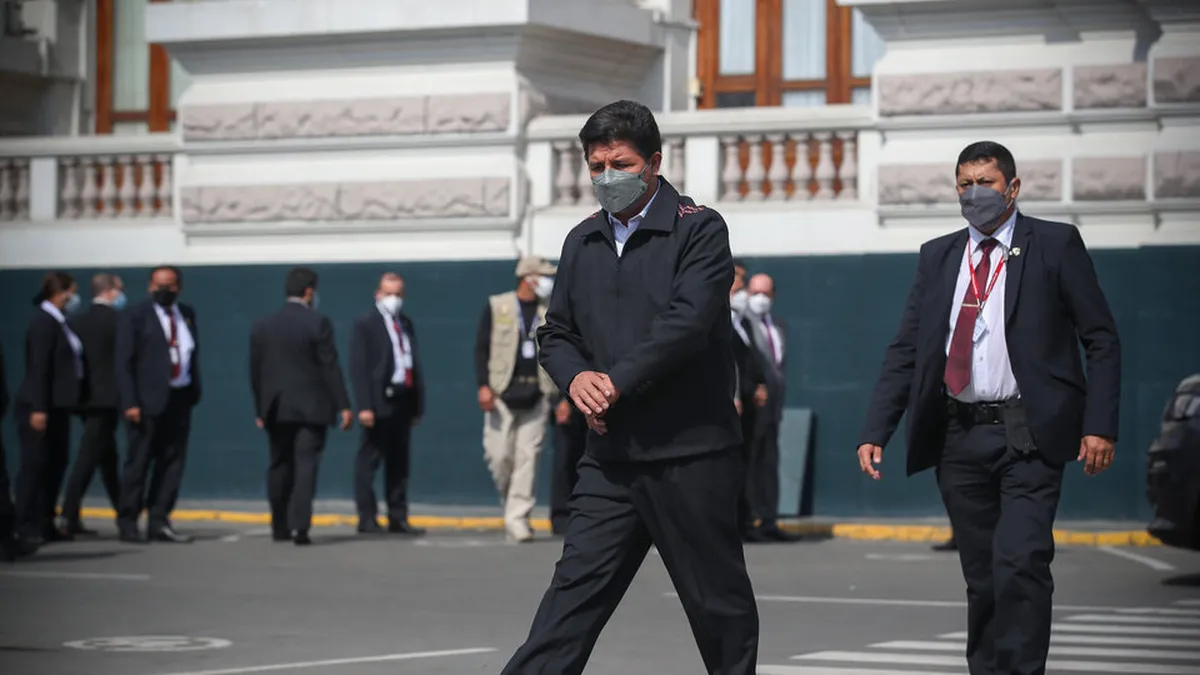
President Pedro Castillo being escorted. Photo: Time News.

Orinoco Tribune – News and opinion pieces about Venezuela and beyond
From Venezuela and made by Venezuelan Chavistas

President Pedro Castillo being escorted. Photo: Time News.
Opponents and some officials of the ousted Peruvian president Pedro Castillo – among them, the until yesterday vice president, Dina Boluarte – described the president’s decision to dissolve Congress, decree an emergency government, call elections for a constituent as a “coup d’état” and undertake the “reorganization” of the Judiciary and the Constitutional Court. In response to such determinations, the Legislature dismissed Castillo by an overwhelming majority and prosecutor Patricia Benavides ordered the arrest of the president until yesterday, who was detained in the Lima Prefecture by the National Police. Immediately, a State Department spokesman declared in Washington that the United States considers Castillo a “former president.”
Without attempting to justify the measures adopted by the former rural teacher, it is important to consider his context: after a year and a half in office, Castillo was unable to carry out the mandate he received at the polls in June of last year –and which included the call for a constituent congress and the deactivation of the Constitutional Court – because during that time his management was systematically sabotaged by the right, both in the legislative, judicial and media spheres. The relevance of the institutional reorganization that the president advocated was dramatically confirmed by 15 months of ungovernability, which is already routine in Peru and which translates into the infeasibility of the Executive Power: from 2018 to date, the Andean nation has had six presidents, several of them dismissed by the Legislature, and even prosecuted.
Orinoco Tribune Editor: There Was a Coup Against Pedro Castillo in Peru
In this context, it is clear that the institutional remodeling of the country and the regeneration of a completely broken political class were and continue to be essential tasks to give Peru a minimum of stability and political certainty. In the case of Castillo, the dysfunctionality of the institutions was taken advantage of from the first day of his government by a corrupt, racist and oligarchic right-wing that experienced as a grievance the arrival at the Government Palace of an indigenous trade unionist willing to apply a program of social justice, sovereignty and recovery of the most basic powers of the State in economic matters.
Even before the 2021 elections, the oligarchic right-wing launched a lynching campaign against Castillo, for which they made use of their media and their parties and all the positions of power they control, and did not hesitate to close ranks in around the candidacy of Keiko Fujimori, daughter of one of the most corrupt and repressive presidents in recent history.
The case of Peru has unavoidable resonances with the media and judicial harassment carried out in Argentina against Vice President Cristina Fernández, with the media, legislative and judicial persecution that deposed Dilma Rousseff in Brazil and put the now president-elect in jail. Luiz Inácio Lula da Silva, as well as the illegal dismissal of Fernando Lugo in Paraguay. Furthermore, the dismissal and arrest of Castillo evoke the media and judicial machinations that preceded the coups perpetrated against José Manuel Zelaya (Honduras, 2009) and Evo Morales (Bolivia, 2019).
Social Movements in Peru Demand New Elections and Constituent Assembly
Seen from this perspective, what happened in Peru is nothing but the culmination of a kind of slow-motion coup d’état that had been building from the very moment that Pedro Castillo yoked the presidential sash; a coup d’état whose purpose was to corner the ruler to make it impossible for him to exercise his position and prevent him from fulfilling the popular mandate that he received from the citizenry.
It confirms that the Latin American right-wing has replaced the bloody coups and military dictatorships with defamation campaigns and sowing hatred and panic, with subversion and ungovernability induced by the so-called lawfare – that is, the harassment from judicial structures delivered to corruption– and by legislative riots.